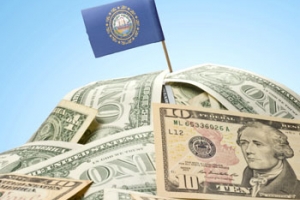Could a state bank create cash during coronavirus, or is this cure worse than the disease?

In early April Gov. Sununu announced New Hampshire would move its cash reserves – about $50 million – from national banks to New Hampshire banks. The goal is to increase local banks’ asset base so they will loan more to small businesses.
Just last year New Hampshire considered another way to use government assets to increase loan opportunities: creating a state bank.
What is a state bank?
A state bank is a bank owned and run by the government. A state bank receives deposits of state money and can choose to accept private money, as well. Like any other bank, a state bank pays interest on deposits, makes loans, and so on. The state gets to keep the bank’s income.
North Dakota is the only state in the country with its own bank. The Bank of North Dakota was established in 1919, largely to give loans to local farmers. Now the bank partners with local financial institutions to make many different kinds of loans, from student loans to business loans. The bank also turns a profit for the state.
Arguments for a state bank
Ideally a New Hampshire state bank would create more inexpensive loan opportunities for government agencies, small businesses, and nonprofits. This is particularly intriguing during the coronavirus emergency, when small businesses and nonprofits are clamoring for loans. Beyond the state of emergency, a state bank could choose to loan to businesses and nonprofits that are working on projects for the public good.
The Bank of North Dakota also shows that a state bank can turn a profit for the government (although several other state banks folded before North Dakota succeeded).
Lastly, state banks could potentially offer services to marijuana businesses. Because marijuana is still illegal at the federal level, banks have been reluctant to work with anyone growing or selling marijuana. As a result, marijuana businesses are forced to work with duffel bags of cash. While New Hampshire has yet to legalize marijuana, medical marijuana is allowed in the Granite State. All of New Hampshire’s neighbors allow recreational use, suggesting full legalization is also in New Hampshire’s future. If a state bank opened its doors to marijuana businesses, it would certainly have customers.
Arguments against a state bank
A state bank wouldn’t magically make money, however. The state would have to pay bank employees, cover the overhead at branch locations, obtain a charter, and more. This is on top of the initial capitalization (starting cash), which would be over $50 million.
Several quasi-public agencies in New Hampshire already expand the lending ability of local banks. For example, the New Hampshire Housing Finance Authority finances affordable housing projects. The New Hampshire Business Finance Authority offers business energy loans, early stage capital, bond financing, and more. These agencies have different areas of expertise, and a state bank would lack that specialized knowledge.
There are also opponents who are concerned a state bank moves away from capitalism towards socialism. Private banks might have trouble competing with a government-run bank.
Is there a chance of a state bank in the Granite State?
In 2019 the New Hampshire House killed a bill to create a state bank, HB 367. There are no 2020 bills on the topic, and the House and Senate have suspended legislative activity during the coronavirus emergency.
Still, the idea of a state bank could make a comeback in 2021. According to the Public Banking Institute, a nonprofit that supports public banking, states from Maine to Arizona have recently considered public bank proposals. The longer the coronavirus emergency continues, and the greater the economic impacts, the more likely New Hampshire policymakers will consider unusual policy responses.











Comments
Login or register to post comments